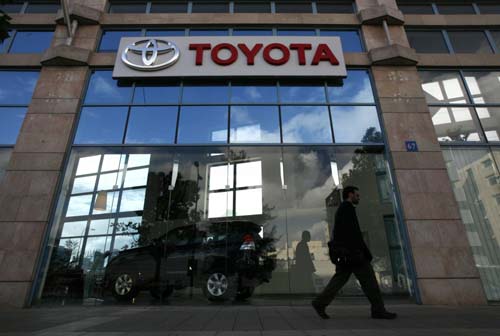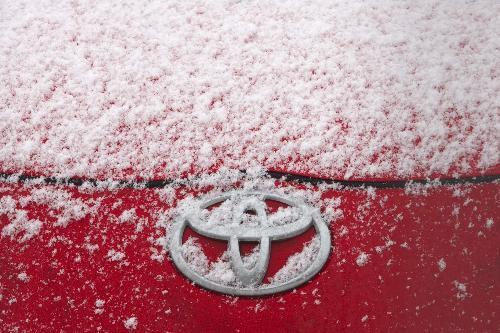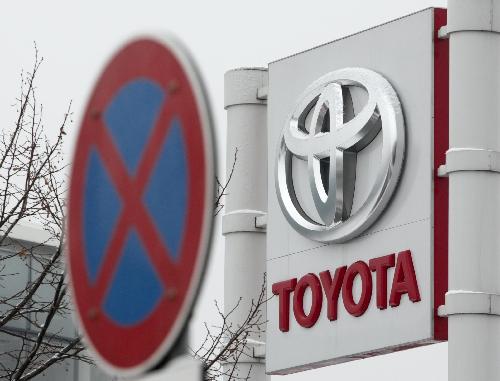Tarnished reputation costs Toyota dearly
|
|
|
An Israeli man walks past a Toyota dealership in Tel Aviv February 3, 2010. Faced with an unprecedented recall of millions of vehicles and rivals swooping in on its customers, the public relations machine at Toyota Motor Corp -- one of the most savvy brand-creators in Asia -- is floundering. [Xinhua] |
The cost of Toyota Motor Corporation's two high-profile recalls totaling 9 million vehicles may run as high as 2 billion U.S. dollars, U.S. analysts said.
But the final bill for Toyota's sudden fall from grace in the United States, its most lucrative market, may be even higher.
"It includes the cost of fixing the problems and the additional incentives that Toyota will have to offer at least the rest of this year," Detroit News quoted Jesse Toprak, an analyst with an auto pricing firm, as saying.
The Japanese automaker also potentially faces huge costs associated with long-term damage to its reputation and litigation.
Toyota has already been forced to pump up sales incentives to attract buyers for the models that weren't affected by its Jan. 21 recall of 2.3 million vehicles to fix faulty pedals.
|
|
|
The Toyota logo is seen on a car covered with snow at a retailer in Vienna February 4, 2010. Toyota Motor Corp shares slid to a 10-month low on Thursday after the U.S. President Barack Obama administration stepped up the pressure on the world's largest carmaker to address a range of safety issues. [Xinhua] |
Toyota's sales slid in January after the company was obliged to stop selling models covered by the recall. In a costly move, the company also halted production of the eight models for a week.
Toyota may recoup some of the lost business, estimated at 20,000 vehicle sales in January, after fixing the pedals.
But the damage to its once sterling reputation could enable Toyota's Japanese rivals and resurgent Detroit automakers to grab some of its U.S. market share over time, an analyst said.
Toyota has felt the impact already. Its U.S. sales fell 15.8 percent in January, and its market share fell three points to 14.1 percent.
In addition to losing sales, Toyota may not be able to command the same price premium for its cars and trucks, analysts said.
The long-term effects on Toyota will depend to some extent on how skillfully it handles the recalls and how its reaction is perceived. The company has stumbled in its initial response, earning a rebuke Tuesday from U.S. Transportation Secretary Ray LaHood, who said Toyota was "a little safety-deaf."
Since September, the automaker has announced two U.S. recalls: one to address sudden unintended acceleration in Toyota and Lexus vehicles that was expanded recently to more than 5.3 million cars and trucks, and a second to check and fix faulty pedals in 2.3 million vehicles. It is recalling an additional 1.9 million vehicles in Europe and China to fix pedals.
Toyota has outlined how it will fix the vehicles in both recalls.
It has not disclosed the cost, but officials may give some indications Thursday when Toyota reports earnings for its first fiscal quarter, which ended on Dec. 31.
Experts estimated the direct cost of these recalls at 660 million dollars, including the downtime at the North American assembly plants.
|
|
|
?The Toyota logo is pictured in front of a retailer in Vienna February 4, 2010. [Xinhua] |
However, indirect costs are mounting. Right after halting sales of recalled vehicles, Toyota cut financing rates for customers and dealers who take out loans to build inventory. Rental car companies that have grounded their recalled Toyotas may seek compensation. And the company's legal expenses could soar.
Analyst Kohei Takahashi of J.P. Morgan estimated the direct cost of the recalls at up to 1.8 billion dollars. He said it would cost as much as 700 million more U.S. dollars if the automaker was unable to resume sales of the eight recalled models for a month during the repairs.
Depending on the details that emerge from hearings and investigations into the recalls, Toyota may have to revise some of its aggressive cost-cutting policies.
If it turns out, for instance, that the pedals could stick because of shoddy materials, Toyota may have to ease the pressure on its suppliers to keep costs down.
 0
0 









